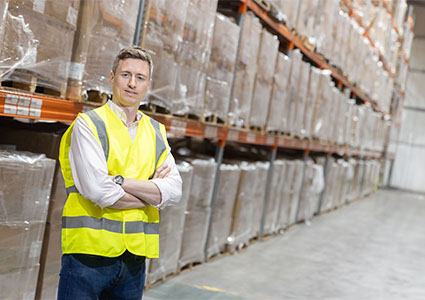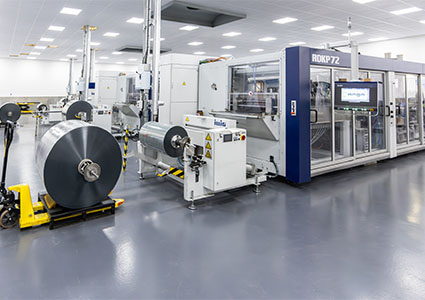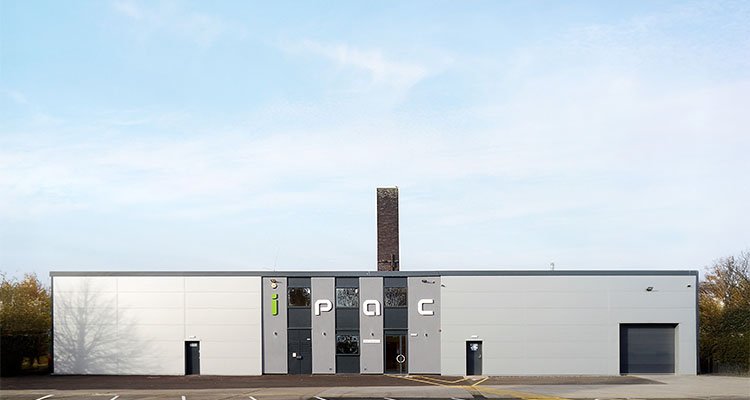How iPac is paving the way in green thermoformed packaging solutions
Since its inception in 2017, family owned and operated thermoforming business iPac Packaging Innovations (iPac), has quickly grown into one of the UK’s leading sustainable packaging providers. Jonny Catto, Managing Director, outlines the company’s history: “I founded the company with my father-in-law, Harry Reed, as we saw an opportunity for a new independent packaging business focused on quality, customer service, sustainability, innovation, and flexibility. This latter element is especially important, as operating primarily in the fast-paced food sector requires us to be extremely flexible. It’s something that we pride ourselves on, and adds significant value to our customers.”
 Jonny goes on to breakdown the product range: “Around 95 percent of our output is for grocery retail. We produce a lot of prepared fruit and side salad trays containing things like coleslaw or potato salad. Around 60 percent though is comprised of meat packaging. This covers a lot of the products you would see on a refrigerated supermarket shelf including sausage trays, burger trays and cooked chicken trays. Protein was an early sector that we got into through business relationships with specific companies. It’s seen a lot of organic growth as we’ve launched a small number of products with a customer, and we very quickly established significant follow on business, which we see as the best form of positive feedback to the iPac experience.”
Jonny goes on to breakdown the product range: “Around 95 percent of our output is for grocery retail. We produce a lot of prepared fruit and side salad trays containing things like coleslaw or potato salad. Around 60 percent though is comprised of meat packaging. This covers a lot of the products you would see on a refrigerated supermarket shelf including sausage trays, burger trays and cooked chicken trays. Protein was an early sector that we got into through business relationships with specific companies. It’s seen a lot of organic growth as we’ve launched a small number of products with a customer, and we very quickly established significant follow on business, which we see as the best form of positive feedback to the iPac experience.”
With sustainability being a key focus of the business, Jonny explains how iPac ensures its products have the most environmentally compatible impact possible: “One of the big ways we achieve this is by using recycled materials, with our products in general having upwards of 80 percent recycled content. We are also very heavily invested in the circular economy around Polyethylene terephthalate (PET) in the UK.
“Almost all our developments and innovations are done with a view to increase the sustainability of the final product. We constantly work on material formulations; one example is the move towards mono-PET solutions. Trays have historically been made with PET lamination, which makes the end product difficult to recycle. Developments such as our MonoSkin® solution ease the transition away from PET/PE for our customers. This change means you only have one material going through the supply chain and recycling infrastructure. This also then feeds into the circular economy.
“We also do a lot of product development, all of which incorporates material efficiency progression – incorporating product design to use the least material possible. We also try to remove any features which make the product more difficult to recycle such as soaker pads for meat and fish products. Our iZorb® product range incorporates design features in the base of the tray which trap liquid and remove the need for the soaker pad. Whether it’s full-scale research and development, or more basic product or material development, it’s all geared towards making our products more recyclable, using less material, and driving the circular economy. We also make sure our materials are as ethically sourced as possible; this includes incorporating prevented ocean plastics into our supply chain.”
Making sure operations are sustainable is also of great importance to iPac. Jonny highlights some of the key focuses: “We have the benefit of having started both our sites from scratch with up-to-date modern energy efficient technology. Internally everything from the lighting to the machinery and equipment has the smallest footprint possible. We also source 100 percent green power to ensure our power comes from renewable sources. As well as this we have analyzed where in our fleet is best to utilize electric vehicles and where combustion works out better. We also have energy minimization equipment on site providing things like free cooling. All these features come together to support our net zero targets.”
our sites from scratch with up-to-date modern energy efficient technology. Internally everything from the lighting to the machinery and equipment has the smallest footprint possible. We also source 100 percent green power to ensure our power comes from renewable sources. As well as this we have analyzed where in our fleet is best to utilize electric vehicles and where combustion works out better. We also have energy minimization equipment on site providing things like free cooling. All these features come together to support our net zero targets.”
Partnering with the right organizations is crucial when relying on science led innovation within the research and development process. Jonny explains iPac’s approach: “We frequently engage with local research organizations including universities and catapult organizations in the North-East. Partnering with these groups means that we can utilize the local infrastructure and implement the scientific developments and pass the benefits down the supply chain to the customers.
“One example is a bio-polymer development project that ran over a two-year period, and involved producing a new formulation of biopolymers that that can functionally perform like PET. With this project we partnered CPI. This approach is one of the main ways we collaborate with research organizations.”
Research led innovations have fueled consistent growth within the company to the extent that iPac has needed to take on a further production facility. Jonny details the process: “When we opened our first facility in Gateshead, we thought it would last us for quite a few years, but within four years we had outgrown it. Our new second site is a larger mirror image of our Gateshead facility. It has a similar productive set-up and similar machinery, but with a much greater capacity. There is also a lot more stockholding space. This is really important for our customers. Within the food sector you must be able to react quickly and a big way that we do that is by holding a lot of stock.
“As well as providing greater production and stocking capacity, the second plant also helps mitigate risk. If were ever to have problems on one site, the other facility won’t be affected. The second site also has sufficient space to facilitate the next few years of growth and expansion.”
The growth journey is far from over. “In 2025 we will put in additional capacity,” Jonny concludes. “This will allow us to continue on-boarding new customers as well as providing further support to existing clients as we continue growing into the second facility.”
